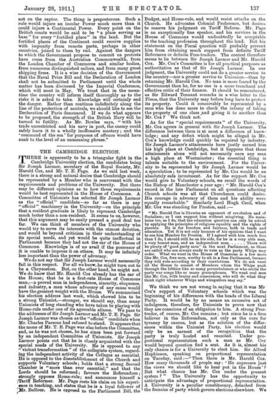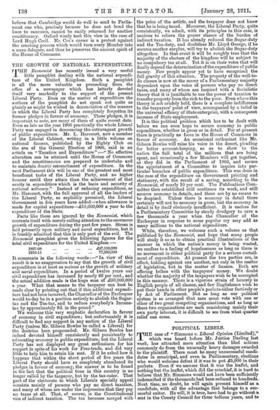THE CAMBRIDGE ELECTION. trtHERE is apparently to be a triangular
fight in the .1_ Cambridge University election, the candidates being Sir Joseph Larmor, secretary of the Royal Society, Mr. Harold Cox, and Mr. T. E. Page. As we said last week, there is a strong and natural desire that Cambridge should be represented by a Member who is conversant with the requirements and problems of the University. But there may be different opinions as to how those requirements would be best represented in the House of Commons. A Committee of Unionists has selected Sir Joseph Larmor as the " official " candidate—so far as there is any "official" machinery in the University—on the principle that a resident graduate is likely to represent Cambridge much better than a non-resident. It seems to us, however, that this argument may be easily pressed a good deal too far. We can think of members of the University who would try to serve its interests with the utmost devotion, and would be beyond criticism in their understanding of its special needs, and yet would be quite ineffectual in Parliament because they had not the ear of the House of Commons. Knowledge is of no avail if the possessor of it is unable to impress it on others. It may be infinitely less important than the power of advocacy. We do not say that Sir Joseph Larmor would necessarily fail in this respect. For all we know, he might turn out to be a Chrysostom. But, on the other hand, he might not. We do know that Mr. Harold Cox already has the ear of the House ; that he is a first-rate House of Commons man,—a proved man in independence, sincerity, eloquence, and industry, a man whose advocacy of any cause would have the greatest weight with the House. We summarised his election address last week, which showed him to be a strong Unionist, —stronger, we should say, than many Unionists of long standing who have taken to playing with Home-rule under one of its agreeable aliases. We pass to the addresses of Sir Joseph Larmor and Mr. T. E. Page. Sir Joseph Larmor was chosen as the "official" candidate when Mr. Charles Parsons had refused to stand. It appears that the name of Mr. T. E. Page was also before the Committee, and, as he was not chosen, he has since been put forward by an independent Committee of Unionists. Sir Joseph tamer points out that he is closely acquainted with the special needs of the University. He is opposed to any "violent transformation" of the collegiate system, regard- ing the independent activity of the Colleges as essential. He is opposed to the disestablishment of the Church and supports Voluntary schools ; holds that a strong Second Chamber is "more than ever essential," and that the Lords should be reformed; favours the Referendum ; strongly opposes Home-rule; and announces himself a :Tariff Reformer. Mr. Page rests his claim on his experi- ence in teaching, and states that he is a loyal follower of ')Ifr. Balfour. He is opposed to the Parliament Bill, the Budget, and Home-rule, and would resist attacks on the Church. He advocates Colonial Preference, but desires to reserve his judgment on Tariff Reform. Mr. Page is an exceptionally fine speaker, and his services in the House of Commons would undoubtedly be acceptable to the teaching profession throughout the land. But his statement on the Fiscal question will probably prevent him from obtaining much support from definite Tariff Reformers or definite Free-traders. The contest therefore seems to lie between Sir Joseph Larmor and Mr. Harold Cox. Mr. Cox's Committee is for all practical purposes as authoritative as that of Sir Joseph Lannon In our judgment, the University could not do a greater service to the country—nor a greater service to Unionism—than by returning Mr. Harold Cox. No man is more feared by the Government than he, for no one is a more trenchant and effective critic of their finance. It should be remembered, as Sir Edward Tennant remarks in a wise letter to the Times, that the University may before long have to protect its property. Could it conceivably be represented by a man who has done more to check the infamy of taking the property of one class And giving it to another than Mr. Cox ? We think not.
As for the "special requirements" of the University, Mr. Cox agrees in general with Sir Joseph Larmor. The difference between them is at most a difference of know- ledge ; and any defect which might be alleged in Mr. Cox's knowledge could quickly be repaired by industry. Sir Joseph Larmor's attainments have justly earned him his high place at Cambridge, but it happens that these attainments alone will not necessarily earn any man a high place at Westminster ; the essential thing is talents suitable to the environment. For the Univer- sity to be represented by Sir Joseph Larmor would be a speculation ; to be represented by Mr. Cox would be an absolutely safe investment. As for the support Mr. Cox would give to Voluntary schools, we recall the words of the Bishop of Manchester a year ago : "Mr. Harold Cox's record in the late Parliament on all questions affecting Church schools was all that Churchmen could desire. His courage in advocacy of them and his ability were equally remarkable." Similarly Lord Hugh Cecil, when Mr. Cox was standing for Preston, said :— Mr. Harold Cox is likewise an opponent of revolution and of Socialism; so I can support him without misgiving. He main- tains too, as I do, that the education question can only be solved by applying the principles of religious equality and the rights of parents. He is for freedom and fairness, both in trade and education. Yet it is not only because of his opinions that I want to see him Member for Preston. If I agreed with him much less than I do, I should still be on his side, for he is a very able man, a very honest man, and an independent man There will be plenty of good party men' in the next Parliament, as those are called who are always ready to vote as the party Whips may order. What we want in the House of Commons is a few more like Mr. Cox, free men, worthy to sit in a free Parliament, because they will vote according to their convictions. We do not want all the House to consist of Members whom the Whips push through the lobbies like so many perambulators or who recite the party war songs like so many gramophones. We want real men like Mr. Cox, with brains and consciences, who will do what they think right whatever Whips and wirepullers may say."
We think we are not wrong in saying that it was Mr Cox's support of Voluntary schools which was the beginning of his differences with the heads of the Liberal Party. It would be by no means an excessive act of indulgence, therefore, for Unionists to prove now that they are conscious of an obligation to him. A strong Free- trader, of course, Mr. Cox remains ; but since he is a firm believer in the Referendum, not only as the cure for tyranny by caucus, but as the solution of the differ- ences within the Unionist Party, his election would only be an earnest of the recognition that the party is truly healed and reunited. Under pro- portional representation such a man as Mr. Cox would beyond question find a seat. As it is, almost his only chance is for a University to elect him. Sir Alfred Hopkinson, speaking on proportional representation on Tuesday, said :—" Then there is Mr. Harold Cox. How many thousands of people say : 'He expresses just the views we should like to hear put in the House ' ? But what chance has Mr. Cox under the present system 9" The University has the opportunity to anticipate the advantage of proportional representation. A University is a peculiar constituency, detached from the frenzies of party which govern elections elsewhere. We believe that Cambridge would do well to send to Parlia- ment one who, precisely because he does not bend the knee to caucuses, cannot be easily returned for another constituency. Oxford wisely took this view in the case of Lord Hugh Cecil. Mr. Cox's career is a protest against the crushing process which would turn every Member into a mere delegate, and thus he preserves the ancient spirit of the House of Commons.























































 Previous page
Previous page